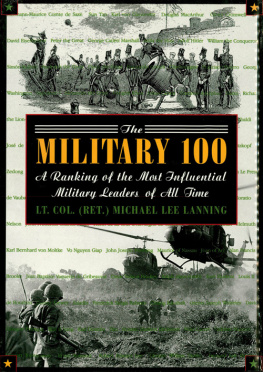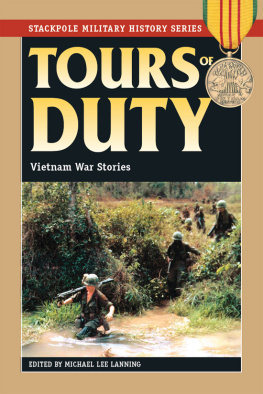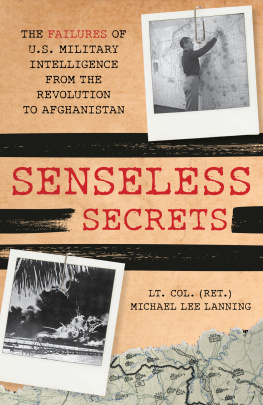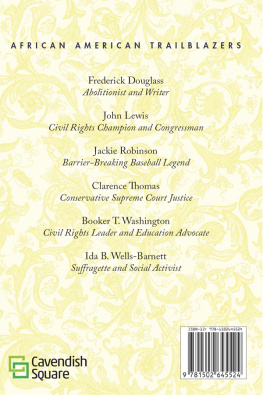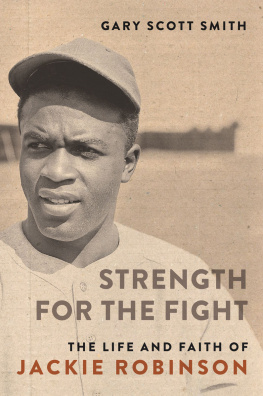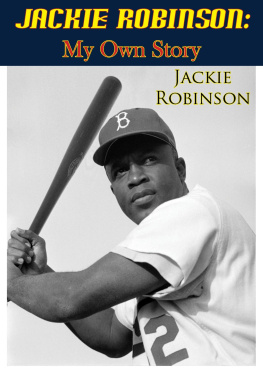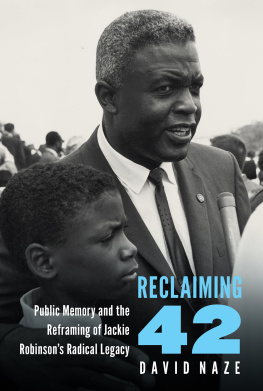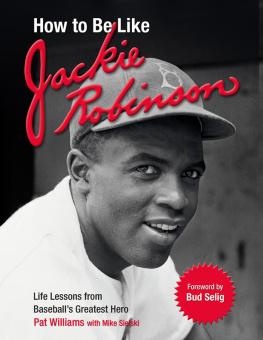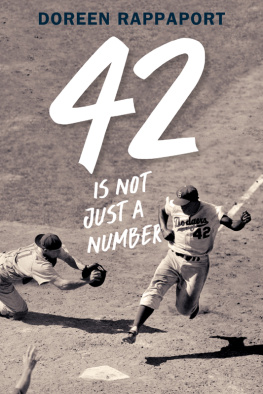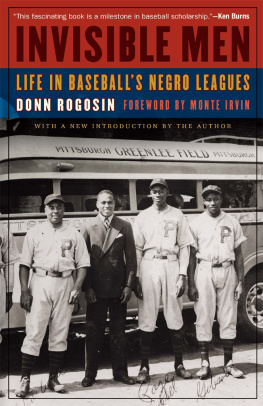Contents
Guide
Michael Lee Lanning is the author of twenty-six nonfiction books on military history, sports, and health. More than 1.1 million copies of his books are in print in fifteen countries, and editions have been translated into twelve languages. He has appeared on major television networks and the History Channel as an expert on the individual soldier on both sides of the Vietnam War.
The New York Times Book Review declared Lannings Vietnam 19691970: A Company Commanders Journal to be one of the most honest and horrifying accounts of a combat soldiers life to come out of the Vietnam War. The London Sunday Times devoted an entire page to review his The Military 100: A Ranking of the Most Influential Military Leaders of All Time. According to the San Francisco Journal, Lannings Inside the VC and NVA is, A well-researched, groundbreaking work that fills a huge gap in the historiography of the Vietnam War.
A veteran of more than twenty years in the U.S. Army, Lanning is a retired lieutenant colonel. During the Vietnam War he served as an infantry platoon leader, reconnaissance platoon leader, and an infantry company commander. In addition to having earned the Combat Infantrymans Badge and Bronze Star with V device with two oak leaf clusters, Lanning is Ranger-qualified and a senior parachutist.
Lanning was born in Sweetwater, Texas, and has a BS from Texas A&M University and an MS from East Texas State University. He currently resides in Lampasas, Texas.
I left McCloskey General Hospital, Temple, Texas, about 1730, 6 July 1944, and went to Temple, Texas on the city bus. I got on another bus and came out to the Officers Club, Camp Hood, Texas, the colored officers club located on 172nd Street. I arrived there at approximately 1930. I was in the club for some time. While in the club I saw Captain McHenry, Lt. Long, Captain Woodruff, and Captain Wales.
I remained at the Officers Club until approximately two and one-half hours later. At approximately 2200 I got on the bus at the 172nd street and Battalion, I believe just outside the colored officers club. I got on the Camp Hood bus. I entered at the front of the bus and moved toward the rear and saw a colored girl sitting in a seat at the middle of the bus. I sat down beside the girl. I knew this girl before. Her name is Mrs. Jones. I dont know her first name. Shes an officers wife here on the post. I sat down there and we rode approximately five or six blocks on the bus and the bus driver turns around and tells me to move to the rear which I did not do. He tells me that if I dont move to the rear he will make trouble for me when we get to the bus station, and I told him that was up to him. When he got to the bus station a lady got off the bus before I got off, and she tells me that she is going to prefer charges against me. That was a white lady. And I said thats all right, too, I dont care if she prefers charges against me. The bus driver asked me for my identification card. I refused to give it to him. He then went to the dispatcher and told him something. What he told him I dont know. He then comes back and tells the people that this nigger is making trouble. I told the bus driver to stop fucking with me, so he gets the rest of the men around there and starts blowing his top and someone calls the MPs. Outside of telling this lady that I didnt care if she preferred charges against me or not, I dont know if they were around or not, sir, I was speaking directly to that bus driver, and just as I told the captain (indicating Captain Wigginton, Camp Officer of the Day) if any one of you called me a nigger I would do the same thing, especially from a civilian, a general or anybody else. I mean I would tell them the same thing. I told him, Im using a general, and general, if anybody calls me a nigger, I dont know the definition of it. Thats just like anyone going around calling you something you dont know what is. The colored girl was going to Belton, her home, and she got off the same time that I got off. The only time I made any statement was when this fellow called me a nigger. I didnt have any loud or boisterous conversation. Thats the only profane language I used if you call it profane. (When told by Captain Bear that that was vulgar and vile language Lt. Robinson said: Thats vulgar is it, thats vile is it?) I want to tell you right now sir, this private you got out there, he made a statement. The private over there in that room, I told him that if he, a private, ever called me that name (a nigger) again I would break him in two. (The private referred to was later called to the MP orderly room and identified as being PFC Ben W. Mucklerath, 37061068, Company B, 149th Tng Bn, 90th Regt, IRTC, Camp Hood, Texas.)
Name of accused: Robinson, Jack R. 0-1031586 Second Lieutenant, Cavalry Company C 758th
Tank Battalion
Charge I: Violation of the 63rd Article of War
Specification 1: In that Second Lieutenant Jack R. Robinson, Cavalry, Company C, 758th Tank Battalion, did, at Camp Hood, Texas, on or about 6 July 1944, behave himself with disrespect toward Captain Peeler L. Wigginton, Quartermaster Corps, 1848th Unit, Eighth Service Command, Army Service Forces, his superior officer, by saying to him, Captain, any Private, you, are any General calls me a nigger and Ill break them in two, I dont know the definition of the word, or words to that effect, and by speaking to the said Captain Peeler L. Wigginton in an insolent, impertinent and rude manner.
Specification 2: In that Second Lieutenant Jack R. Robinson Cavalry, Company C, 758th Tank Battalion, did, at Camp Hood, Texas, on or about 6 July 1944, behave himself with disrespect toward Captain Gerald M. Bear, Corps Military Police, 1848th Unit, Eighth Service Command, Army Services Forces, his superior officer, by contemptuously bowing to him and giving him several sloppy salutes repeating several times OK Sir, OK Sir or words to that effect, and by acting in an insolent, impertinent, and rude manner toward the said captain Gerald M. Bear.
Charge II: Violation of the 64th Article of War
Specification: In that Second Lieutenant Jack R. Robinson, Cavalry, Company C, 758th Tank Battalion, having received a lawful order from Captain Gerald M. Bear, Corps Military Police, 1848th Unit, Eighth Service Command, Army Service Forces, his superior officer, to remain in a receiving room and be seated in a chair on the far side of the receiving room, did, at Camp Hood, Texas, on or about 6 July 1944 willfully disobey the same.
Charge III: Violation of the 95th Article of War
Specification 1: In that Second Lieutenant Jack R. Robinson, Cavalry, Company C, 758th Tank Battalion, did, at Camp Hood, Texas on or about 6 July 1944, wrongfully use the following abusive and vulgar language toward Milton N. Renegar, a civilian, Hood Village, Texas, Im not going to move a God damn bit or words to that effect, and called the said Milton N. Renegar a son of a bitch, in the presence of ladies.
Specification 2: In that Second Lieutenant Jack R. Robinson, Cavalry, Company C, 758th Tank Battalion, did, at Camp Hood, Texas on or about 6 July 1944, wrongfully say the following vile and obscene language toward Elizabeth Poitevint, a civilian, Killeen, Texas, You better quit fuckin with me or words to that effect.
Specification 3: In that Second Lieutenant Jack R. Robinson, Cavalry, Company C, 758th Tank Battalion, did, at Camp Hood, Texas on or about 6 July 1944, wrongfully use vile, obscene, and abusive language in a public place in the presence of ladies, to wit, on a public bus and at the Central Bus Station, Camp Hood, Texas.
D uring my tour of duty as Camp Officer of the Day, Camp Hood, Texas, 6 July 1944 at approximately 2230 I was summoned to the Military Police Guard House by the Sergeant of the Guard, Sergeant Painter, to interview a colored 2nd Lt., Jack R. Robinson of the 761st Tank Battalion. When I entered the Guard Room Lt. Robinson was talking in an insolent manner and directing his words to the Sergeant of the Guard, and a Pfc. Ben W. Mucklerath. I inquired of Sgt. Painter as to the nature of the trouble, and he inferred to me that Lt. Robinson had been picked up at the Central Bus Station upon the request of the dispatcher there, for creating a disturbance. I then asked the Lt. to give me a resume of the incident, and he gave me the following story: that he had boarded camp shuttle outside the colored officers club, and saw a colored girl, a Mrs. Jones, wife of an officer on this post, sitting about half-way down the isle of the bus; he sat down with her and before arriving at the next bus stop the bus driver asked him to move to the rear of the bus. Lt. Robinson then told the bus driver that he was the equal of anyone, and would not move; the bus driver then told the Lt. that if he did not move he would make plenty of trouble for him when they arrived at the Central Bus Station. When they arrived at the Bus Station the driver asked the dispatcher to call the MPs, and Lt. Robinson told me that he then told the bus driver that If you dont quit fuckin with me Ill cause you plenty of trouble. He further said that the bus driver then asked him for his name, rank, and serial number, and organization, and that he refused to give the information to the driver, and said that he would not give his name to a damn civilian. He said that the white soldier, PFC Mucklerath, and some others were standing there and that they called him a nigger, and then some white lady said she was going to report him to the MPs, and that he told them he didnt care what they did, that he didnt know what nigger meant, and that anyone who called him that was going to get into plenty of trouble.


